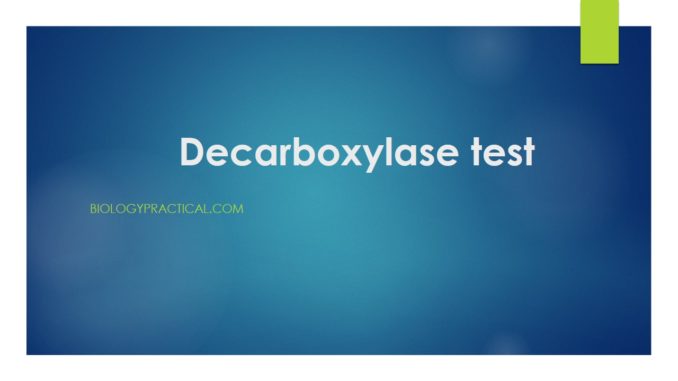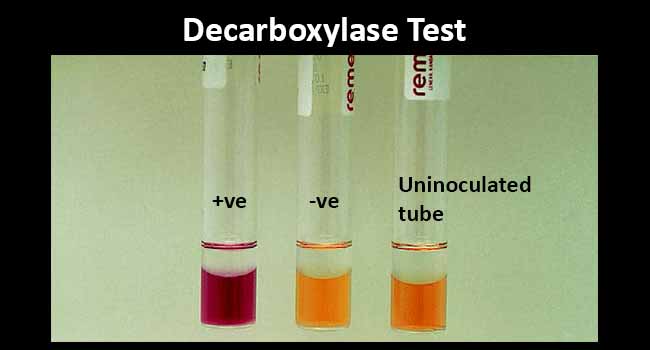
Principle of Decarboxylase test:
- Decarboxylases are a group of enzymes which acts by hydrolyzing an amino acid to form an amine.
- Decarboxylase test is mainly performed to differentiate decarboxylase producing Enterobacteriaceae from other gram-negative rods.
- The decarboxylation of the amino acid yields in an alkaline pH and a change in color of pH indicators bromocresol and cresol red from orange to purple is observed.
Requirements:
- Media: Brain-heart infusion broth, Blood agar, Decarboxylase broth
- Test-tubes
- Incubator
- Sterile mineral oil
composition of Decarboxylase broth
- Composition———————————–g/ltr
- Peptic digest of animal tissue——– (5 g)
- beef extract ———————————-(5 g)
- bromocresol purple ———————-(0.1 g)
- cresol red————————————- (0.005 g)
- dextrose —————————————(0.5 g)
- pyridoxal ————————————(0.005 g)
- amino acid ———————————–(10 g)
- pH-6.0
Procedure of Decarboxylase test:
- Glucose-Nonfermenting Organisms:
- Prepare a suspension (≥McFarland No. 5 turbidity standard) in brain-heart infusion broth from 18-24hr old culture on 5% sheep blood agar.
- With 4 drops of broth, inoculate each of the three decarboxylase broths (arginine, lysine, and ornithine) and the control broth (no amino acid).
- To each tube, add a 4-mm layer of sterile mineral oil.
- Incubate the cultures at 35°-37°C in ambient air.
- Examine the tubes at 24, 48, 72, and 96 hours.
- Glucose-Fermenting Organisms:
- With 1 drop of an 18- to 24-hour brain-heart infusion broth culture, inoculate each tubes.
- To each tube, add a 4-mm layer of sterile mineral oil.
- Incubate the cultures for 4 days at 35°-37°C in ambient air.
- Observe and examine the tubes at 24, 48, 72, and 96 hours.
Results Interpretations:
- Positive test:
- It is indicated by the alkaline pH and change in coloration from orange to purple.
- Negative test:
- It is suggested by no change in colour in both test and control tubes and growth is visible in the control tube.

